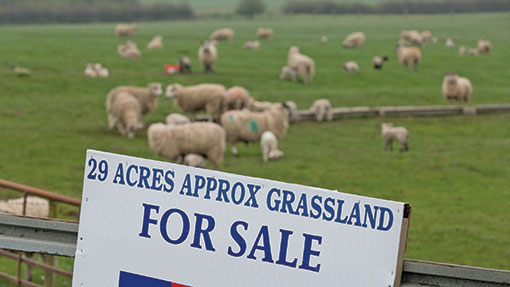Expert advice on preparing farmland for sale

Selling a farm has the potential to be a hugely stressful process, particularly when it combines a family home, business, livelihood and possibly an inheritance, writes Charles Dudgeon, head of farms and estates for Savills.
For the majority of sellers, the primary objective is to achieve the best price.
To do this, preparing for the sale well in advance of marketing is essential and will help to avoid delays or potential conflicts.
Clarify ownership and occupation
Are all the ownership details correct? If the farm is owned by a company, is the company or only the property assets for sale? All owners must be consulted on the decision to sell and must sign the appointed agent’s letter of instruction.
 Charles Dudgeon
Charles DudgeonHead of farms & estates, Savills
Consider whether you want to secure vacant possession on any land, buildings or dwellings which are let. Also consider sporting rights – is the intention to retain them or include in the sale?
Compile documentation
Choose a solicitor who has experience with farm conveyances – a common reason for sales being held up is delays with the legal team.
Help them be in a position to act efficiently once a sale is agreed by providing copies of all the relevant documents before marketing commences. This includes:
- An up-to-date farm plan
- A copy of the title deeds
- Rural Land Register maps where the single farm payment is claimed
- All tenancy/licence agreements for land and any let residential or commercial properties
- Paperwork supporting commitments to government-backed schemes or designations
- Details of any planning permissions
- Records of building regulation approvals
- Planning ties such as agricultural occupancy conditions.
Draw up a list of fixtures and fittings included in the sale price and another list of items you would be willing to sell and at what price.
Decide on private v public marketing
Key steps to a sale
- Keep farming as if you are staying there
- Appoint a solicitor at an early stage
- Identify all the relevant paperwork
- Be clear on exactly what is for sale
- Prepare the farm fully for sale
- Be positive but patient
Most selling agents will offer you the option of a private or public sale. The former has the advantage of keeping news of the sale private, but may leave you wondering whether the best possible price was achieved.
Openly marketing a property using advertising, the internet and the press is the most effective way of reaching the widest target audience. Sale by auction is rarely used today for whole farms but remains popular for blocks of bare land, particularly when there are likely to be competing neighbours.
Make your farm stand out
Continue to farm as if you were staying, including making any minor improvements you had planned.
A sale can be won or lost by first impressions so don’t give a potential purchaser the idea that you are giving up on the farm.
Make sure potholes are filled in, fencing is repaired, gates hung, gutters cleared, weeds killed off, sheds mucked out and grass topped.
Potential buyers will be comparing your farm to others, so simple tricks such as adding an extra dose of nitrogen to grass and reducing livestock numbers so there is an abundance of grass, will help show off your farm to its full potential.
For arable farms, make sure the relevant crops are sown – you can either be compensated for these or include a holdover clause in the heads of terms.
Show off your farm’s performance
Have details of at least the past five years of cropping and at least three years of yield history. Records of regular soil testing provide buyers with comfort that the land has not been exhausted of all its natural resources.
Likewise, have lambing percentages, calving rates and average milk yields available for stock farms.
Have drainage plans to hand and details of any recent improvements to drainage systems that have been made.
If the farm has won any awards or other noteworthy achievements, let people know.
Be upfront
Remove all potential for confusion, which will erode a potential buyer’s confidence. Do not surprise a buyer once negotiations are under way over issues such as rights of way, private water supplies or a local development that may affect the farm – let them know from the outset.
Above all remember first impressions really do count and the time spent preparing paperwork and the farm for sale will all be worthwhile.
